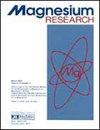膳食镁对心血管疾病预防和治疗的建议。以色列心脏协会和以色列饮食协会的立场文件。
IF 1
4区 医学
Q4 BIOCHEMISTRY & MOLECULAR BIOLOGY
引用次数: 3
摘要
现代生活和西方工业化饮食加剧了我们食物中镁的减少,这可能会导致镁的轻微或绝对缺乏。镁缺乏在老年人、心肌梗死和/或慢性心力衰竭患者以及糖尿病患者中尤为明显。在以色列,超过60%的饮用水来自缺乏镁的脱盐海水,这可能导致低镁血症。如果我们意识到这种情况,镁缺乏症很容易通过补充镁来治疗。本文总结了以色列心脏病学会和以色列饮食协会于2021年4月发表的立场文件中关于镁的章节。它总结了预防和治疗心血管疾病的循证营养建议,重点是根据欧洲心脏病学会定义的证据水平和实用建议。最好的建议是增加摄入富含镁的食物,如绿叶蔬菜(主要是菠菜)、坚果、鳄梨、全谷物、豆类(如豆类、豌豆和大豆)、巧克力和某些海鲜。然而,对于那些不能从饮食中获得足够镁的人来说,应该考虑每天补充600毫克的镁。此外,心力衰竭患者、接受利尿剂治疗的患者和服用质子泵抑制剂的患者应至少每六个月检查一次血清镁水平。此外,高血压和心力衰竭患者心肌梗死后添加镁可能有助于降低心血管发病率和死亡率(推荐等级IIa,证据水平B)。本文章由计算机程序翻译,如有差异,请以英文原文为准。
Dietary recommendations of magnesium for cardiovascular prevention and treatment. A position paper of the Israel Heart Society and the Israel Dietetic Association.
Modern life and the Western industrial diet has enhanced the reduction of magnesium in our food, which may contribute to a marginal or absolute magnesium deficiency. Magnesium deficiency is evident in, among others, the elderly population, those after myocardial infarction and/or chronic heart failure, and diabetics. In Israel, over 60% of the drinking water originates from desalinated seawater lacking magnesium, which may cause hypomagnesemia. Magnesium deficiency can easily be treated by magnesium supplementation if we are aware of the situation. This paper summarizes the magnesium chapter in a position paper published in April 2021 by the Israeli Cardiology Society together with the Israeli Dietetic Association. It summarizes evidence-based nutritional recommendations for prevention and treatment of cardiovascular disease, with emphasis on the level of evidence and practical recommendations according to the European Society of Cardiology definitions. The best recommendation is to increase consumption of magnesium-rich food, such as leafy green vegetables (mainly spinach), nuts, avocado, whole grains, legumes (e.g., beans, peas and soy beans), chocolate and certain seafood. However, for people who do not get sufficient magnesium from their diet completing the daily amount, as needed, with supplements of up to 600 mg/day should be considered. In addition, serum magnesium levels should be checked at least every six months in patients with heart failure, people taking diuretic therapy, and people taking proton-pump inhibitors. In addition, it may be beneficial to add magnesium following myocardial infarction in people with hypertension and in heart failure patients in order to reduce cardiovascular morbidity and mortality (class of recommendation IIa, level of evidence B).
求助全文
通过发布文献求助,成功后即可免费获取论文全文。
去求助
来源期刊

Magnesium research
医学-内分泌学与代谢
CiteScore
3.50
自引率
9.40%
发文量
6
审稿时长
>12 weeks
期刊介绍:
Magnesium Research, the official journal of the international Society for the Development of Research on Magnesium (SDRM), has been the benchmark journal on the use of magnesium in biomedicine for more than 30 years.
This quarterly publication provides regular updates on multinational and multidisciplinary research into magnesium, bringing together original experimental and clinical articles, correspondence, Letters to the Editor, comments on latest news, general features, summaries of relevant articles from other journals, and reports and statements from national and international conferences and symposiums.
Indexed in the leading medical databases, Magnesium Research is an essential journal for specialists and general practitioners, for basic and clinical researchers, for practising doctors and academics.
 求助内容:
求助内容: 应助结果提醒方式:
应助结果提醒方式:


